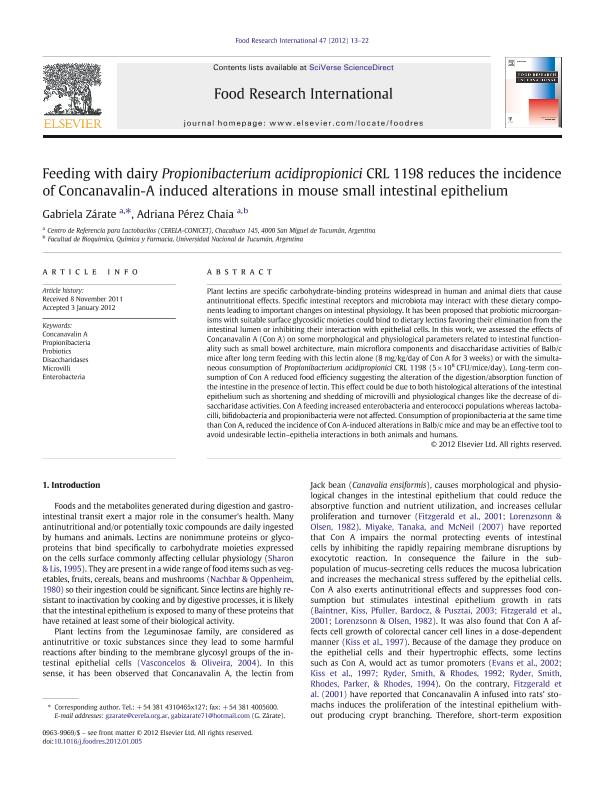Mostrar el registro sencillo del ítem
dc.contributor.author
Zarate, Gabriela del Valle

dc.contributor.author
Perez Chaia, Adriana Beatriz

dc.date.available
2017-09-22T16:31:43Z
dc.date.issued
2012-06
dc.identifier.citation
Zarate, Gabriela del Valle; Perez Chaia, Adriana Beatriz; Feeding with dairy Propionibacterium acidipropionici CRL 1198 reduces the incidence of Concanavalin-A induced alterations in mouse small intestinal epithelium; Elsevier Science Sa; Food Research International; 47; 1; 6-2012; 13-22
dc.identifier.issn
0963-9969
dc.identifier.uri
http://hdl.handle.net/11336/24933
dc.description.abstract
Plant lectins are specific carbohydrate-binding proteins widespread in human and animal diets that cause antinutritional effects. Specific intestinal receptors and microbiota may interact with these dietary components leading to important changes on intestinal physiology. It has been proposed that probiotic microorganisms with suitable surface glycosidic moieties could bind to dietary lectins favoring their elimination from the intestinal lumen or inhibiting their interaction with epithelial cells. In this work, we assessed the effects of Concanavalin A (Con A) on some morphological and physiological parameters related to intestinal functionality such as small bowel architecture, main microflora components and disaccharidase activities of Balb/c mice after long term feeding with this lectin alone (8 mg/kg/day of Con A for 3 weeks) or with the simultaneous consumption of Propionibacterium acidipropionici CRL 1198 (5×108 CFU/mice/day). Long-term consumption of Con A reduced food efficiency suggesting the alteration of the digestion/absorption function of the intestine in the presence of lectin. This effect could be due to both histological alterations of the intestinal epithelium such as shortening and shedding of microvilli and physiological changes like the decrease of disaccharidase activities. Con A feeding increased enterobacteria and enterococci populations whereas lactobacilli, bifidobacteria and propionibacteria were not affected. Consumption of propionibacteria at the same time than Con A, reduced the incidence of Con A-induced alterations in Balb/c mice and may be an effective tool to avoid undesirable lectin-epithelia interactions in both animals and humans.
dc.format
application/pdf
dc.language.iso
eng
dc.publisher
Elsevier Science Sa

dc.rights
info:eu-repo/semantics/openAccess
dc.rights.uri
https://creativecommons.org/licenses/by-nc-sa/2.5/ar/
dc.subject
Concanavalin A
dc.subject
Propionibacteria
dc.subject
Probiotics
dc.subject
Disaccharidases
dc.subject
Microvilli
dc.subject
Enterobacteria
dc.subject.classification
Ética relacionada con Biotecnología Médica

dc.subject.classification
Biotecnología de la Salud

dc.subject.classification
CIENCIAS MÉDICAS Y DE LA SALUD

dc.title
Feeding with dairy Propionibacterium acidipropionici CRL 1198 reduces the incidence of Concanavalin-A induced alterations in mouse small intestinal epithelium
dc.type
info:eu-repo/semantics/article
dc.type
info:ar-repo/semantics/artículo
dc.type
info:eu-repo/semantics/publishedVersion
dc.date.updated
2017-07-26T15:25:56Z
dc.identifier.eissn
1873-7145
dc.journal.volume
47
dc.journal.number
1
dc.journal.pagination
13-22
dc.journal.pais
Canadá

dc.journal.ciudad
Otawa
dc.description.fil
Fil: Zarate, Gabriela del Valle. Consejo Nacional de Investigaciones Científicas y Técnicas. Centro Científico Tecnológico Conicet - Tucumán. Centro de Referencia para Lactobacilos; Argentina
dc.description.fil
Fil: Perez Chaia, Adriana Beatriz. Consejo Nacional de Investigaciones Científicas y Técnicas. Centro Científico Tecnológico Conicet - Tucumán. Centro de Referencia para Lactobacilos; Argentina. Universidad Nacional de Tucumán. Facultad de Bioquímica, Química y Farmacia; Argentina
dc.journal.title
Food Research International

dc.relation.alternativeid
info:eu-repo/semantics/altIdentifier/doi/http://dx.doi.org/10.1016/j.foodres.2012.01.005
dc.relation.alternativeid
info:eu-repo/semantics/altIdentifier/url/http://www.sciencedirect.com/science/article/pii/S096399691200035X
Archivos asociados
